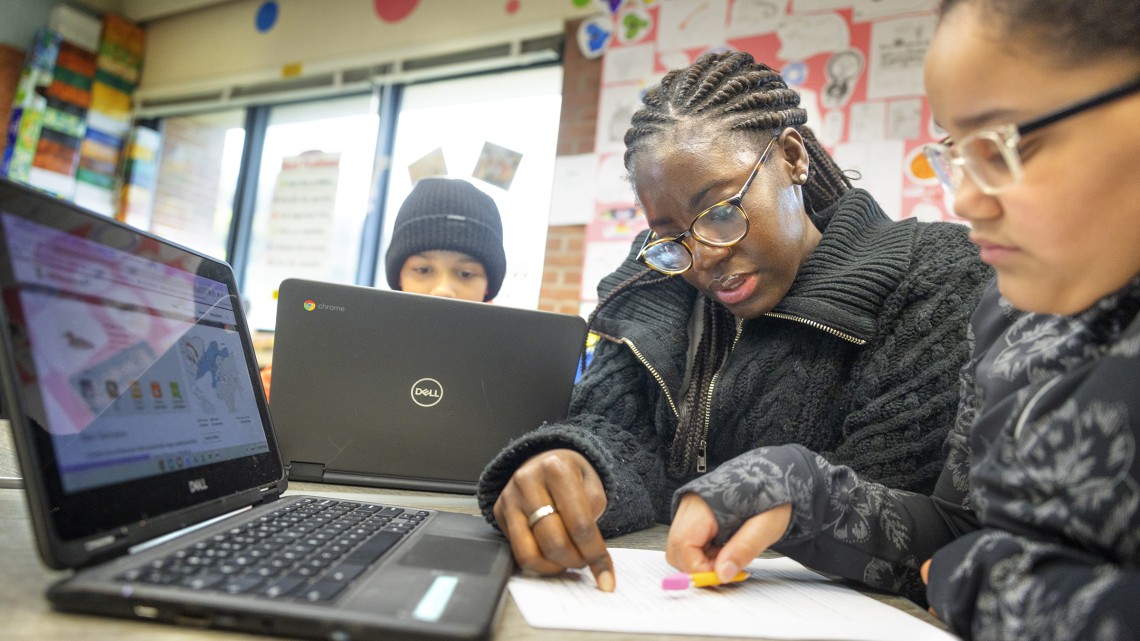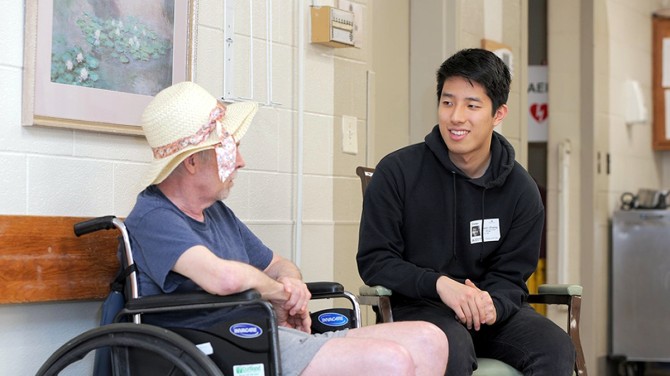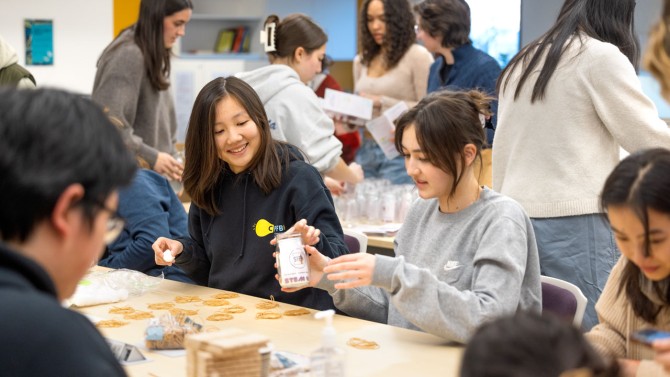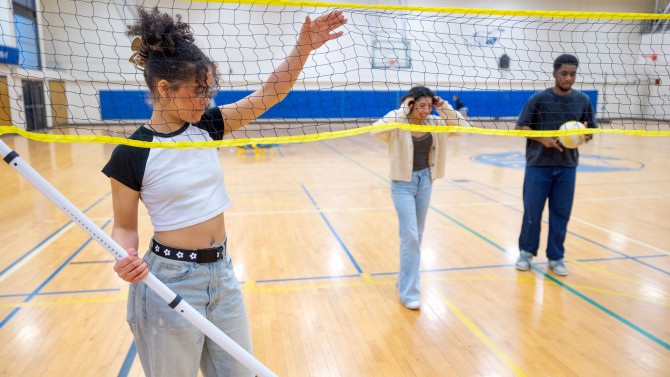
Jordan Amoako ’24, center, is a biology and society major in the College of Arts and Sciences.
Through service, students deepen Cornell’s ties to community
By Aaron Arm
Beyond Cornell’s main campus, thousands of students can be found serving others in the Ithaca area, from tutoring in schools to assisting in animal shelters to language translation and interpretation. The Einhorn Center for Community Engagement helps Cornellians make a positive impact both locally and globally – through learning courses, research and student programs. To celebrate National Volunteer Week, a few students shared their experiences.
Jordan Amoako ’24 is a biology and society major in the College of Arts and Sciences. She is a member of the Raising Educational Attainment Challenge (REACH) program, where she tutors and mentors students in local schools. She also volunteers at the Ithaca Free Clinic.
What drew you to REACH?
For me, education is essential. Coming from a first-generation [American] household, I’ve seen how mobilizing education can be. My brother and I, around our first year of high school, founded a nonprofit called the One Book Foundation, which emphasizes increasing child literacy rates within Ghana. Education has always been something that I’ve had incredible value in.
Is there a moment that stood out to you when working with a student?
Something that stood out to me is the eagerness to learn. The students want to learn. They want to be in the classroom. They’re asking questions, are so inquisitive, and they know so much more than I think I ever did when I was in fifth grade.
Has your work in the community sparked any interest or inspiration for your future plans?
I see myself working as a medical educator, wanting to educate BIPOC groups and serve as a source of information to help close health care disparities. Education is something that we can all use to help create change in the world, no matter what profession you have.
Dean Zhang ’25 is majoring in biological sciences, computer science and music in the College of Arts and Sciences. As a member of Elderly Partnership at Cornell, he serves at the Beechtree Center for Rehabilitation & Nursing, where he spends time with senior residents.
Is there an experience with the Elderly Partnership that was particularly rewarding?
A particularly rewarding achievement was the success of our "Advancing Technology for Senior Citizens" project. This initiative aimed to improve technological literacy and diminish the isolation many elderly residents felt, especially highlighted during the pandemic, by providing them with technology to connect with their families and the outside world. Seeing their excitement and engagement with the technology was incredibly fulfilling and reinforced the importance of our work.
Based on the work your program has done so far, what do you think the future holds?
Looking ahead, I envision deeper ties between the elderly and the Ithaca community, reducing isolation and enhancing their sense of belonging. We aim to further empower seniors through technology, fostering connections with their families and the wider world. Our current efforts have laid a solid foundation, and I am excited about the future possibilities for enriching the lives of our elderly community members through greater inclusivity and connectivity.
What advice would you give to someone who’s considering getting involved in community engagement at Cornell, either with this partnership or a different group?
My advice is to stay true to yourself and embrace what makes you distinctive. For instance, my own connection with a resident over our shared enthusiasm for football and the Super Bowl highlighted how personal interests can forge unexpected bonds. Every interaction is a unique opportunity to learn, grow, and support a cause. Approach these experiences with an open heart and an eager mind.
Wendy Lin ’25 is an industrial and labor relations major in the ILR School. She is a member of the Community Partnership Funding Board (CPFB), a grant funding board for undergraduate students. CPFB is dedicated to initiating and supporting grassroots, community action projects.
When and why did you join CPFB?
I began volunteering with the Community Partnership Funding Board during my first semester at Cornell as a spring semester second-year student. I knew I wanted to get involved in the community, especially within Tompkins County, because I believe that one way to familiarize yourself with a community is to serve.
Tell me about the other students or faculty involved in this program.
I am beyond grateful to my fellow board members and our advisor, Joyce Muchan. I definitely found “community” within the Community Partnership Funding Board and the Einhorn Center for Community Engagement. I am always learning from my peers and value their opinions, perspectives, and experiences. Moreover, when I am surrounded by my peers, I know I am part of a larger community of student leaders.
Is there anything you’d like to add about community engagement at Cornell and in the surrounding community?
Students are involved in campus service at Cornell, but I don’t think they know just how much they can accomplish by partnering with local community members and organizations to enact social change. They may also underestimate the lens that local community members operate with to address prevailing injustices.
Courtney Knight ’25 is a philosophy and government major in the College of Arts and Sciences. She is a member of Compass at Cornell, which supports activities for at-risk youth at George Junior Republic (GJR) High School.
What sort of work or activities have you done with GJR students?
The first program I was involved with was a chess club, run by me and the former president of Compass during the spring of 2023. We would go to GJR once a week and teach the students chess strategy, play chess with them, and simply interact with the kids there and learn about their experiences or answer any questions they have about our experiences. During the fall of 2023, I ran an arts and creative writing club at GJR with three of our “G-Body” members.
What’s the Compass program like?
The Compass volunteer group consists of students with a passion for public service. We work with kids from rough pasts and are aware of how we interact with them, as to not exacerbate any hardship they have experienced in the past. This dedication to creating safe and healing spaces for kids that we interact with for an hour a week is a very unique and admirable quality in all of our volunteers. Programming in this air of gratitude has positively influenced my outlook on life and illuminated the hidden blessings that happen every day.
Is there anything you’d like to add about community engagement at Cornell and in the surrounding community?
Volunteering in the Tompkins County community has been a breath of fresh air for me while at Cornell. Being able to escape the barrage of obligations and rigorous academic responsibilities Cornell demands while giving back to a community that I have been a part of for almost three years reminds me to appreciate the greater beauties of humanity.
Media Contact
Get Cornell news delivered right to your inbox.
Subscribe

